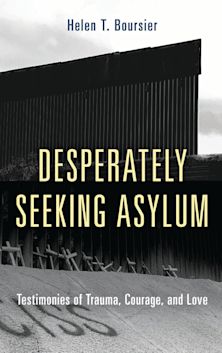Rethinking Disaster Recovery
A Hurricane Katrina Retrospective
Rethinking Disaster Recovery
A Hurricane Katrina Retrospective
Description
Rethinking Disaster Recovery focuses attention on the social inequalities that existed on the Gulf Coast before Hurricane Katrina and how they have been magnified or altered since the storm. With a focus on social axes of power such as gender, sexuality, race, and class, this book tells new and personalized stories of recovery that help to deepen our understanding of the disaster. Specifically, the volume examines ways in which gender and sexuality issues have been largely ignored in the emerging post-Katrina literature. The voices of young racial and ethnic minorities growing up in post-Katrina New Orleans also rise to the surface as they discuss their outlook on future employment. Environmental inequities and the slow pace of recovery for many parts of the city are revealed through narrative accounts from volunteers helping to rebuild. Scholars, who were themselves impacted, tell personal stories of trauma, displacement, and recovery as they connect their biographies to a larger social context. These insights into the day-to-day lives of survivors over the past ten years help illuminate the complex disaster recovery process and provide key lessons for all-too-likely future disasters. How do experiences of recovery vary along several axes of difference? Why are some able to recover quickly while others struggle? What is it like to live in a city recovering from catastrophe and what are the prospects for the future? Through on-the-ground observation and keen sociological analysis, Rethinking Disaster Recovery answers some of these questions and suggests interesting new avenues for research.
Table of Contents
Chapter 1: Rethinking Disaster Recovery: Editor's Introduction, Jeannie Haubert
Part I: Gender and Sexuality in the Recovery Process
Chapter 2: Trauma, Recovery, and Sexuality in Post- Katrina New Orleans, Mimi Schippers
Chapter 3: It’s Raining Men: Gender and Street Harassment in Post-Katrina New Orleans, Andrea Wilbon Hartman, Erica Dudas, and Jennifer Day-Sully
Chapter 4: Ten Years Later: Domestic Violence and Hurricane Katrina, Pamela Jenkins and Bethany Van Brown
Chapter 5: Missing in the Storm: The Gender Gap in Hurricane Katrina Research and Disaster Management Efforts, Kristen Barber and Shiloh Deitz
Part II: Race and Class in the Recovery Process
Chapter 6: On the Kindness of Strangers: Am I More Worthy of Your Sympathy than Lakisha and Jamal?, Jeannie Haubert
Chapter 7: Disaster, Reconstruction, and Racialization: Latinos in New Orleans After Hurricane Katrina, Elizabeth Fussell and Amy Bellone-Hite
Chapter 8: Flourishing or Floundering? Examining the Career Paths of African American Emerging Adults in Post-Katrina New Orleans, Farrah Gafford Cambrice
Chapter 9: New Orleans’ Katrina Recovery for Whom and What? A Race, Gender, and Class Approach, Jean Ait Belkhir
Part III: Doing Academia Through Disaster
Chapter 10: Trauma Survivor as Author; Method as Recovery, Jessica W. Pardee
Chapter 11: Housing Market Mayhem: Problems Studying Discrimination Post-Disaster, Jeannie Haubert
Chapter 12: “We’re Still in the Trenches Baby”: Navigating Academia in an Uncertain, Post-Katrina World, Danielle Antoinette Hidalgo and Dana M. Greene
Chapter 13: Learning from Disaster: Post-Katrina New Orleans as a Sociological Classroom, Timothy J. Haney
Postscript, Dana M. Greene
Product details
| Published | 05 Feb 2015 |
|---|---|
| Format | Ebook (Epub & Mobi) |
| Edition | 1st |
| Extent | 258 |
| ISBN | 9781498501217 |
| Imprint | Lexington Books |
| Illustrations | 6 BW Photos |
| Publisher | Bloomsbury Publishing |

































